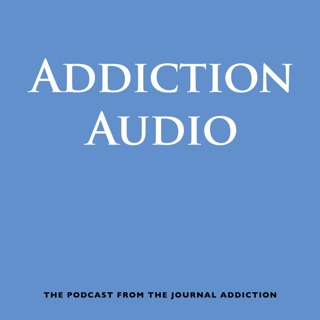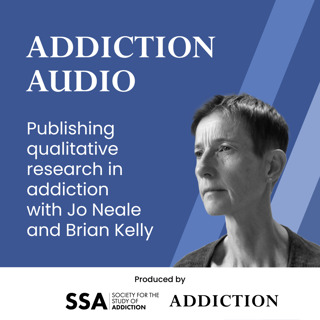
Racial equity, research and the SRNT taskforce with Mignonne Guy and Megan Piper
In this episode of Addiction Audio, Drs Mignonne Guy and Megan Piper talk about their work on the racial equity taskforce for the Society for Research on Nicotine and Tobacco (SRNT). It was a powerful and wide-ranging discussion about developing anti-racist practice, social constructs of race, research methods, society organisations and research funding structures. Megan and Mignonne began by talking about why the racial equity taskforce was set up, how they determined what to do and the findings of the SRNT policy review. They then discuss wider issues of race and inequality that run throughout academia, describing how health disparity research can be suppressed and discouraged as well as the impact of the tobacco industry’s racist history. The discussion then focuses on how key research concepts – including methods often considered central to public health research – need to change or be replaced in order to eliminate the impact of structural racism on research and on population health. They finally offer advice to organisations about how to undertake their own racial equity reviews. “When we look at our policies and we see that there’s nothing about race, no, that’s not surprising … because that’s how this invisible dominant whiteness takes over everything – by excluding those groups and not explicitly referring to other populations.” - Dr Mignonne Guy “So, this scientific premise that we have been operating under and training …. so many scientists under that the population can be controlled for doesn’t work. [This] really does elevate the importance of studying specific populations because their experiences are so very different they can’t be controlled for.” - Dr Megan Piper “We’re asking people to divest from their scientific legacy and to try to construct something new and be part of that and pioneering this type of work” - Dr Mignonne Guy Hosted on Acast. See acast.com/privacy for more information.
29 Sep 202247min

Ontologies and tobacco, nicotine and vaping products with Sharon Cox
In this episode we talk to Dr Sharon Cox about developing an ontology around nicotine and tobacco products. Sharon also talks about the importance of ontologies and how they are important for research. She talks about how to manage disagreements when developing a system that categorises and defines products, behaviours and properties. “So, as researchers, which we are, we should be pedants and we should think it’s important that the products we write about we write about with accuracy.” “Because we want to be clear, we want to be really clear with the public. We want to make sure that we’re writing lay outputs, developing ad campaigns advising companies….. we want to make sure that we’re communicating the science of our subject as clearly as we can. And that really starts with our academic work.” Original article: Toward an ontology of tobacco, nicotine and vaping products by Sharon Cox and colleagues. Published in Addiction (2022) Hosted on Acast. See acast.com/privacy for more information.
8 Sep 202227min

Opioid agonist treatment, drug related deaths and dynamic models with Matt Hickman
In this episode, Professor Matt Hickman talks about using population modelling to identify the population implications of Opioid Agonist Treatment (OAT). He covers the impact that OAT has on drug-related deaths and other causes of mortality as well as how models can be used to explore what mortality rates would have been without OAT in New South Wales, Australia.Professor Hickman talks about their findings that, without OAT, the number of overdose deaths would have been 50% higher.“So, what we were trying to do in this study was to model the counter-factual of how many deaths there would be if there hadn’t been any opioid agonist treatment. In theory the ideal model would be a trial in which you have OAT versus no OAT in a population, now clearly that’s unethical and can’t be done.”He also talks about how the research team set up a dynamic model that they used to explore the data, matching incarceration and OAT records. They then used those data alongside findings from systematic reviews to model the hypothetical impact of OAT on a real population.“We’ve done models before, theoretical models which say ‘if we increase the opioid agonist treatment programme and we increase duration at a certain point what impact would that have?’ but that’s rarely based on actual real data. So …there’s modelling and there’s modelling, and this model is based on real empirical data and we think that gives it a bit more credence”. Original paper here: Modeling the population-level impact of opioid agonist treatment on mortality among people accessing treatment between 2001 and 2020 in New South Wales, Australia by Antoine Chaillon and colleagues. Published in Addiction (2022) Hosted on Acast. See acast.com/privacy for more information.
14 Aug 202218min

Cannabis use and bipolar disorder with Alexander Denissoff
In this episode Dr Alexander Denissoff talks about his recent research into the potential associations between cannabis use and later life bipolar disorder. He discusses the basis for hypotheses that link cannabis and bipolar disorder, outlining what the Northern Finland Birth Cohort is and how it was used in this study.“It’s an ongoing birth cohort which included 99% of all live births in the two northern-most provinces in Finland between July 1985 and June 1986 and originally included 9,432 live born children. And 73.8% of the participants originally included in the cohort were included in this study…. It’s an exceptional dataset considering the generalisability of the results to the general population” Dr Denissoff talks about his finding that associations between cannabis use and bipolar disorder did not persist once other factors were accounted for. “The association attenuated to non-significant after adjusting to frequent alcohol intoxications, illicit drug use and daily smoking. But even if the association was not seen as independent of other substances, early cannabis use can nevertheless be thought of as a signal of a potential adverse mental health trajectory.”Original research article: Is Early Exposure to Cannabis Associated with Bipolar disorder? Results from a Finnish Birth-Cohort Study. By Alexander Denissoff and colleagues. Published in Addiction (2022) Hosted on Acast. See acast.com/privacy for more information.
30 Juni 202220min

Gambling, risk-taking and alcohol with Tori Horn
In this episode, Tori Horn from the University of Memphis talks about her recent systematic review of risk-taking and gambling whilst drinking.Tori talks about the moderators between alcohol and risk-taking and how her and her colleagues screened 30,000 papers to examine the influence of blood alcohol concentration, gender, the type of gambling and other factors as potential moderators of this relationship.“We thought perhaps that, what’s influencing this is the expectancies, and the vast majority of studies included used the placebo design […] which led us to conclude that maybe people are expecting, once they’re told they’re consuming alcohol, that their behaviour’s going to be different.” Tori talks about the different ways that risk-taking is measured in studies, including inflating balloons until they burst for a cash pay-out. She also explores the problems with lab designs and the challenge of translating research into naturalistic settings. Original research article: Does acute alcohol consumption increase risk-taking while gambling? A systematic review and meta-analysis. By Tori Horn and colleagues. Published in Addiction (2022). Hosted on Acast. See acast.com/privacy for more information.
15 Juni 202216min

Brief interventions, emergency departments, and alcohol with Paolo Deluca
In this episode of the Addiction Audio podcast, Dr Paolo Deluca talks about his recent research on using brief interventions in emergency departments.The research involved a three-armed randomised controlled trial on brief interventions for young people, and found no significant differences in alcohol-related outcomes between young people who had been given a brief intervention and those who had not. In the podcast, Paolo reflects on some of the potential reasons for this, considering previous evidence in support of brief interventions.“When you move away from an efficacy trial or a single site study where you have highly trained professionals or practitioners delivering the interventions and you move into the real-world NHS setting is where you tend to lose some of the effectiveness you might have had in the early stages of the brief intervention.”Paolo also talks about the core components of brief interventions that can be delivered in 10 minutes in busy emergency departments, and discusses some of the logistical and ethical challenges of recruiting young people to a three-armed trial.“We involved 10 emergency departments, and we ran it for around 8 months and were recruiting from 10am to 10pm in the afternoon and we were covering 7 days a week. To achieve that we had essentially an army of researchers.”Original article: Effectiveness and cost-effectiveness of face-to-face and electronic brief interventions versus screening alone to reduce alcohol consumption among high risk adolescents presenting to Emergency Departments: three-arm pragmatic randomised trial (SIPS Junior High Risk Trial). By Paolo Deluca and colleagues. Published in Addiction (2022). Hosted on Acast. See acast.com/privacy for more information.
8 Juni 202223min

Drug checking services with Nazlee Maghsoudi
In this episode of Addiction Audio, Nazlee Maghsoudi talks about her recent publication “Drug checking services for people who use drugs: a systematic review”. Nazlee discusses how drug checking services change behaviour, contribute to drug market monitoring and otherwise impact the risk associated with using substances. She talks about the three waves of drug checking services from the late 1960s to present day. Nazlee talks about the benefits of working with library sciences experts when setting the search parameters for her systematic review. She also talks about how important it is for physicians or GPs to know what substances people might have taken. “We know from the systematic review [people who use drug checking services] do make changes in their behaviour, they do take that information into account, and whether it’s choosing to not use, choosing to use less, choosing to seek more information before they use, that gives them information to make more informed choices about the drugs they use.” Nazlee is the Manager of the Policy Impact Unit at the Centre on Drug Policy Evaluation in Toronto, and a PhD Candidate in Health Services Research at the Institute of Health Policy, Management and Evaluation within the University of Toronto.Original research article: Drug checking services for people who use drugs: a systematic review By Nazlee Maghsoudi and colleagues. Published in Addiction (2021) Hosted on Acast. See acast.com/privacy for more information.
7 Apr 202224min

Drinking patterns during lockdown with Iain Hardie
Dr Iain Hardie talks to Addiction Audio about his research into alcohol use changes during lockdown. His research is the first to report longitudinal data on changes in drinking quantities and characteristics. Dr Hardie talks about using an interrupted time series analysis to identify the impact of the pandemic on drinking habits. “A lot of [drinking] occasions in general that start earlier in the day are quite often people meeting up for long drinking occasions or big social occasions that last the whole day, whereas when lockdowns were in place those occasions weren’t possible so people were drinking later on in the day” Iain discusses how Scotland and England differ in the numbers of people who drink alone and talks about the potential long-term consequences resulting from changes in drinking patters whereby more people currently drink at home and fewer go out to pubs and bars. Hosted on Acast. See acast.com/privacy for more information.
23 Mars 202216min





















